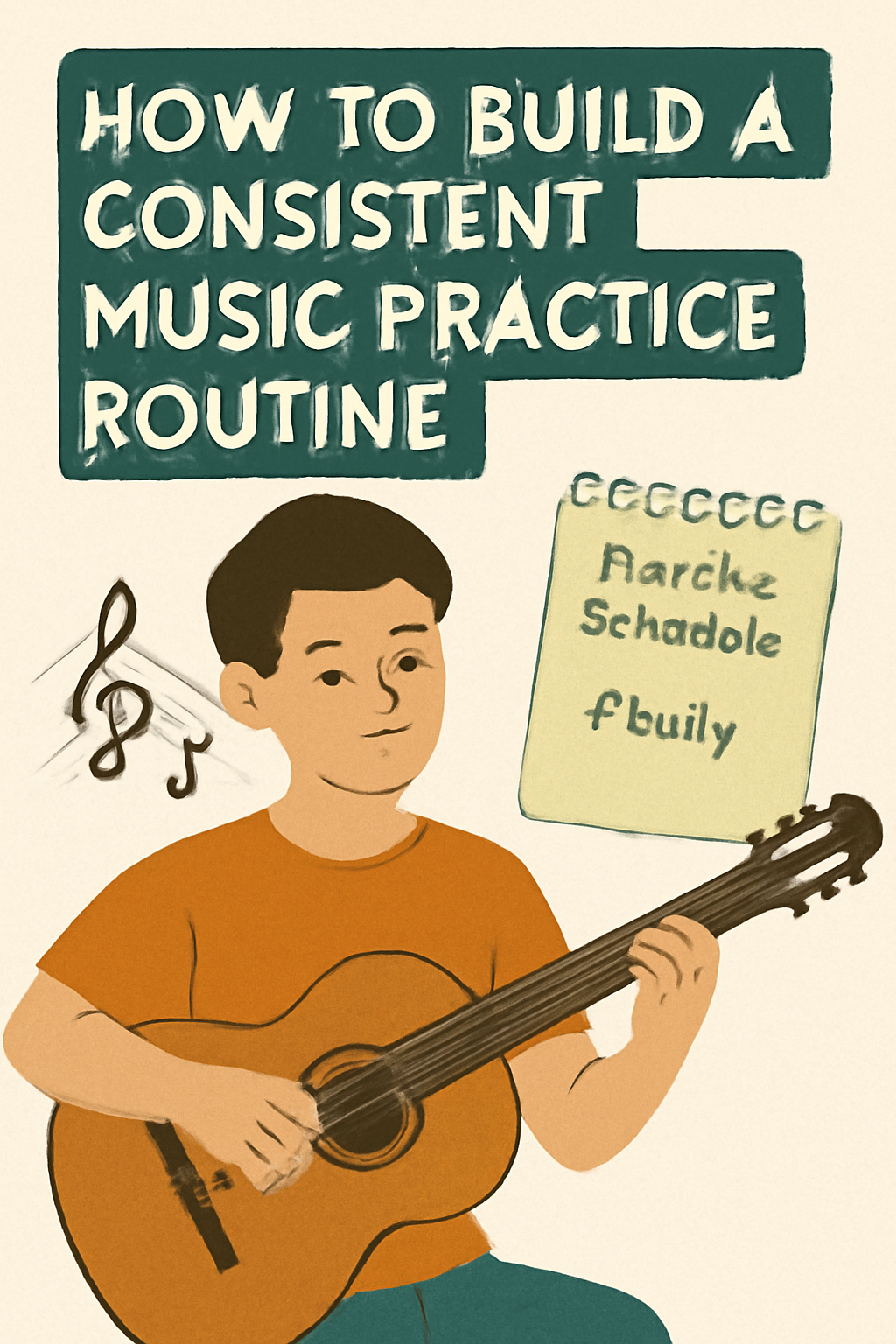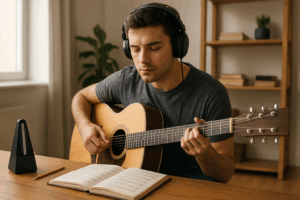One of the key factors to becoming a skilled musician is the ability to practice consistently. Learning to play an instrument, improve your vocal skills, or master music theory requires more than just natural talent—it requires dedication, patience, and, most importantly, consistency.
Many beginners struggle with staying on track when it comes to practice. Without a structured routine, it can be easy to miss sessions, get discouraged, or become overwhelmed by the amount of material to learn. In this article, we’ll explore how to build a consistent practice routine that works for you and helps you make steady progress in your musical journey.
Why Consistency Matters for Music Learners
Consistency is often the missing link between those who make steady progress and those who struggle to improve. Here are a few reasons why consistency is essential in music practice:
- Improvement over time: Regular practice allows you to gradually build on what you’ve learned. Small improvements every day add up to significant progress over weeks and months.
- Skill development: Many musical skills, such as finger placement, timing, and muscle memory, can only develop with consistent practice. The more you practice, the more natural these skills become.
- Building confidence: When you practice regularly, you become more comfortable with your instrument, which boosts your confidence. The more familiar you are with your instrument, the more you can focus on improving your technique and musical expression.
- Avoiding bad habits: Inconsistent practice or practicing in a haphazard way can lead to the development of bad habits. Regular practice helps you maintain correct technique and proper form.
How to Develop a Consistent Music Practice Routine
Building a consistent practice routine takes time, but with the right approach, you can make it a natural part of your day. Here’s how to get started:
1. Set Clear Goals
Having clear, achievable goals is essential to staying motivated and consistent. Without goals, it can be easy to get lost or discouraged in your practice sessions. When setting your goals, be specific and make them measurable.
For example:
- Short-term goals: “Learn the first verse of my song by the end of the week.”
- Long-term goals: “Play a full song fluently within the next month.”
- Technique goals: “Master this chord transition by the end of the week.”
By setting clear goals, you have a sense of direction and purpose in your practice. This will make your sessions more productive and help you stay focused.
2. Create a Schedule
One of the best ways to build consistency is to establish a practice schedule. Just like any other habit, practicing music requires regularity. Start by deciding how much time you can realistically dedicate to practice each day. For beginners, practicing for 20-30 minutes daily is a great starting point.
Consider your other commitments and find a time that works best for you. Whether it’s in the morning before work or school or in the evening after dinner, set aside dedicated time for practice each day. It’s better to practice a little each day than to cram long sessions once a week.
3. Make Practice a Part of Your Daily Routine
Consistency is all about forming habits. To make practice a part of your daily routine, try to practice at the same time each day. This builds a habit and reduces the chances of skipping practice because you’re making it a regular part of your day.
If possible, try to schedule practice at a time when you’re least likely to be distracted or tired. It’s easier to stay focused when you’re not trying to practice while juggling other tasks.
4. Break Your Practice Into Focused Segments
Instead of sitting down for an hour and trying to practice everything at once, break your practice session into smaller, focused segments. Each segment should focus on a specific area of your playing, such as technique, song practice, ear training, or theory.
For example, your practice session could look like this:
- 5 minutes: Warm-up exercises
- 10 minutes: Technique practice (e.g., scales, finger exercises)
- 10 minutes: Song practice (learning a new piece)
- 5 minutes: Cool-down and review
This structure helps keep your practice varied and ensures you’re covering all the necessary aspects of learning music.
5. Track Your Progress
Tracking your progress is an excellent way to stay motivated and focused. It helps you see how far you’ve come and reminds you of the improvements you’ve made, even when things feel slow. Keep a practice journal or use an app to log your practice sessions, what you worked on, and any goals you achieved.
Regularly reviewing your progress will give you a sense of accomplishment and reinforce your commitment to consistency. It’s also a great way to identify areas where you need to focus more attention.
6. Be Realistic and Adjust as Needed
While consistency is key, it’s important to be realistic about your goals and the amount of time you can devote to practice. If life gets in the way, don’t be too hard on yourself. It’s okay to miss a session occasionally as long as you get back on track the next day.
If you find that your schedule is too tight or that you’re struggling to maintain focus, adjust your practice routine. Shorter, more frequent sessions may be more effective than long, infrequent ones.
Common Challenges and How to Overcome Them
As you work to establish your practice routine, you may face some common challenges. Here’s how to deal with them:
1. Lack of Time
If you’re struggling to find time to practice, try breaking your practice sessions into smaller blocks. Even 10-15 minutes of focused practice is better than not practicing at all.
Another way to find time is by integrating practice into your daily routine. For example, practice scales or songs while watching TV, or listen to music theory podcasts on your commute. Small adjustments like these can help you stay on track.
2. Lack of Motivation
If you’re struggling to stay motivated, set small, achievable goals and celebrate your progress. This helps keep you excited about your practice and reinforces the rewards of consistent effort.
Additionally, try to practice music that excites you. If you’re learning an instrument, choose songs that you enjoy listening to. If you’re learning theory, find ways to make it engaging and fun, such as using music apps or games.
3. Frustration with Progress
When you feel frustrated with your progress, take a step back and remember that learning music is a marathon, not a sprint. Everyone progresses at their own pace, and setbacks are a natural part of the journey. Take a break if needed, and remind yourself why you started in the first place.
Building a consistent practice routine is one of the most important steps in your musical journey. By setting clear goals, creating a practice schedule, breaking your sessions into focused segments, and tracking your progress, you’ll be able to stay on track and see steady improvement.
Remember, consistency is the key to success. Practice regularly, adjust as needed, and keep a positive attitude. Over time, your dedication and consistency will lead to musical growth and mastery.




